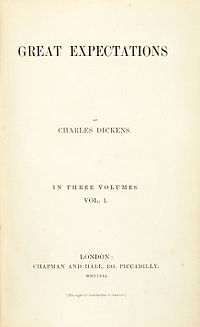
Back آمال عظيمة Arabic Böyük ümidlər Azerbaijani Големите надежди Bulgarian গ্রেট এক্সপেকটেশানস Bengali/Bangla Velika očekivanja BS Grans Esperances Catalan Uōng-dâi Cièng-tiàng CDO ئاواتە گەورەکان CKB Nadějné vyhlídky Czech Great Expectations Welsh
 Title page of Vol. I of first edition, July 1861 | |
| Author | Charles Dickens |
|---|---|
| Country | United Kingdom |
| Language | English |
| Genre | Novel, Bildungsroman |
| Set in | Kent and London, early to mid-19th century |
| Published | Serialised 1860–61; book form 1861 |
| Publisher | Chapman & Hall |
| Media type | |
| Pages | 544 (first edition 1861) |
| OCLC | 1269308353 |
| 823.83 | |
| LC Class | PR4560 .A1 |
| Preceded by | A Tale of Two Cities |
| Followed by | Our Mutual Friend |
| Text | Great Expectations at Wikisource |
Great Expectations is the thirteenth novel by Charles Dickens and his penultimate completed novel. It depicts the education of an orphan nicknamed Pip (the book is a Bildungsroman, a coming-of-age story). It is Dickens' second novel, after David Copperfield, to be fully narrated in the first person.[N 1] The novel was first published as a serial in Dickens's weekly periodical All the Year Round, from 1 December 1860 to August 1861.[1] In October 1861, Chapman & Hall published the novel in three volumes.[2][3][4]
The novel is set in Kent and London in the early to mid-19th century[5] and contains some of Dickens's most celebrated scenes, starting in a graveyard, where the young Pip is accosted by the escaped convict Abel Magwitch. Great Expectations is full of extreme imagery—poverty, prison ships and chains, and fights to the death—and has a colourful cast of characters who have entered popular culture. These include the eccentric Miss Havisham, the beautiful but cold Estella, and Joe Gargery, the unsophisticated and kind blacksmith. Dickens's themes include wealth and poverty, love and rejection, and the eventual triumph of good over evil. Great Expectations, which is popular with both readers and literary critics,[6][7] has been translated into many languages and adapted numerous times into various media.
Upon its release, the novel received near-universal acclaim.[6] Although Dickens's contemporary Thomas Carlyle referred to it disparagingly as "that Pip nonsense", he nevertheless reacted to each fresh instalment with "roars of laughter".[8] Later, George Bernard Shaw praised the novel, describing it as "all of one piece and consistently truthful".[9] During the serial publication, Dickens was pleased with public response to Great Expectations and its sales;[10] when the plot first formed in his mind, he called it "a very fine, new and grotesque idea".[11]
In the 21st century, the novel retains good standing among literary critics[12] and in 2003 it was ranked 17th on the BBC's The Big Read poll.[13]
Cite error: There are <ref group=N> tags on this page, but the references will not show without a {{reflist|group=N}} template (see the help page).
- ^ "Was Dickens Really Paid By the Word?". University of California Santa Cruz: The Dickens Project. Regents of the University of California. Archived from the original on 14 September 2013. Retrieved 15 February 2013.
- ^ Dickens, Charles (1861). Great Expectations. Vol. I (First ed.). London: Chapman & Hall. Retrieved 6 January 2017 – via Internet Archive.
- ^ Dickens, Charles (1861). Great Expectations. Vol. II (First ed.). London: Chapman & Hall. Retrieved 6 January 2017 – via Internet Archive.
- ^ Dickens, Charles (1861). Great Expectations. Vol. III (First ed.). London: Chapman & Hall. Retrieved 6 January 2017 – via Internet Archive.
- ^ "Great Expectations by Charles Dickens". Cliffsnotes. Archived from the original on 28 October 2012. Retrieved 30 October 2012.
- ^ a b Cite error: The named reference
s263was invoked but never defined (see the help page). - ^ Cite error: The named reference
HillisMillerwas invoked but never defined (see the help page). - ^ Cummings, Mark, ed. (2004). The Carlyle Encyclopedia. Cranbury, New Jersey: Associated University Presses. p. 122.
- ^ Shaw, George Bernard (2006). Bloom, Harold (ed.). Charles Dickens. Bloom's Modern Critical Views. New York: Infobase Publishings. p. 60.
- ^ Cite error: The named reference
Boylewas invoked but never defined (see the help page). - ^ Hollington, Michael (1984). "The Grotesque and Tragicomedy in Dickens' Great Expectations". Dickens and the Grotesque (Revised ed.). London: Croom Helm. Archived from the original on 24 December 2014. Retrieved 13 May 2015.
- ^ Cite error: The named reference
Ciabattari2015was invoked but never defined (see the help page). - ^ Cite error: The named reference
BigRead2003was invoked but never defined (see the help page).
© MMXXIII Rich X Search. We shall prevail. All rights reserved. Rich X Search